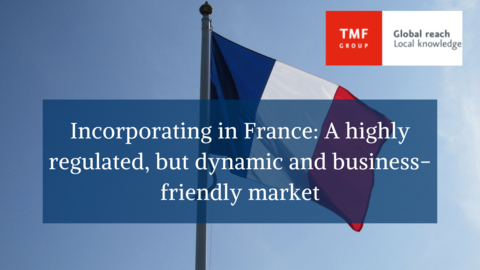Actus des entreprises
Incorporating in France: A highly regulated, but dynamic and business-friendly market

France was ranked as the second most complex jurisdiction globally for business in TMF Group’s recent Global Business Complexity Index (GBCI).
However, France is a dynamic market with an investment-friendly business environment, a stable and transparent legal framework, and generous research and development tax incentives.
A highly regulated jurisdiction
While France is highly regulated, it offers a guarantee of transparency, continuity and legal certainty.
Formal administrative processes and high standards of regulation are based on EU and Organisation for Economic Co-operation and Development (OECD) regulations, including:
- UBO declaration: disclosure of the Ultimate Beneficial Owner(s) of a company
- Mandatory Disclosure Rules (MDR): DAC6 reporting obligations, regarding certain cross-border arrangements
- General Data Protection Regulation (GDPR)
However, in order to promote business expansion and attract foreign investment, the French Government continues to explore ways to improve the country’s regulatory environment.
Types of entities
Traditionally, French corporate structures are divided between limited liability companies and unlimited liability companies. However, many entity types exist in France for customised business solutions. The most commonly used are:
- Société par actions simplifiée (SAS) or Simplified joint-stock company
- Société à responsabilité limitée (SARL) or Limited liability company
- Société anonyme (SA) or Public limited company
- Société civile immobilière (SCI) or property investment company.
It’s important to review your company’s strategy, in order to choose the best entity for your business in France.
Incorporation and directorship
Incorporating a company involves multiple steps.
The French equivalent of the LLC, the SARL, offers limited liability for all shareholders, not just directors and managers. It is relatively easy to set up, inexpensive and flexible when it comes to financing.
A company can be incorporated in about one month when all documents are in order. The documents required include articles of incorporation (in duplicate), a letter of appointment of directors, and a list of the full names, addresses, occupations and nationalities of each shareholder.
There is no minimum share capital or investment.
While there is no nationality or residency requirement, directors can be held liable for the company’s non-compliance.
Opening a bank account
The opening of bank accounts is known to be problematic in France. Anti-fraud and money laundering regulations and associated ‘Know Your Customer’ rules have heightened scrutiny, but the process of opening a business account is mandatory, and this complexity means that it can take months.
At the time of opening, the bank will inquire about business activity, turnover, the reasons for opening of the account and the purposes of the account. In addition, in certain cases, the bank may inquire about the origin and destination of funds, the estimated value of forthcoming transactions (in order to identify ‘suspicious transactions’), and, if available or relevant, major customers and suppliers.
To open an account, the bank will typically require the corporate documents (articles of association and registration extract); a complete and signed organisational chart; and clear identification of each UBO, including key personal details and copies of the directors’ passports.
Complexity in managing entities
All accounting in France is subject to local language requirements, which can prove challenging for non-French-speaking businesses. Accounting documents are kept in French, with the Euro as the currency, and French GAAP is mandatory.
France is one of the world’s most complex jurisdictions for HR and payroll. Companies may face many legal changes and updates, and new financial rules are being enacted each year.
The significant complexity and constant evolution of accounting and tax and HR and payroll regulations require finding the right strategic partner to ensure compliance, adapting to the language of local regulation and support your growth strategy.
Language and culture
It’s important for companies entering the French market to consider local norms and understand cultural differences, in order to make the process of incorporation and entity management as smooth as possible.
While all business formalities in France are subject to local language requirements, the French Government is proposing more services in English to foreign investors on its institutional websites and has introduced the initiative of ‘Business France’ – a website aimed at promoting French businesses abroad and promoting inbound investment by assisting foreign companies interested in establishing operations in France.
Local assistance is critical to navigating the maze of administrative and linguistic complexity.
While France can be a complex jurisdiction for incorporation and entity management, a new pragmatic vision is currently being implemented by the government to promote further investment.